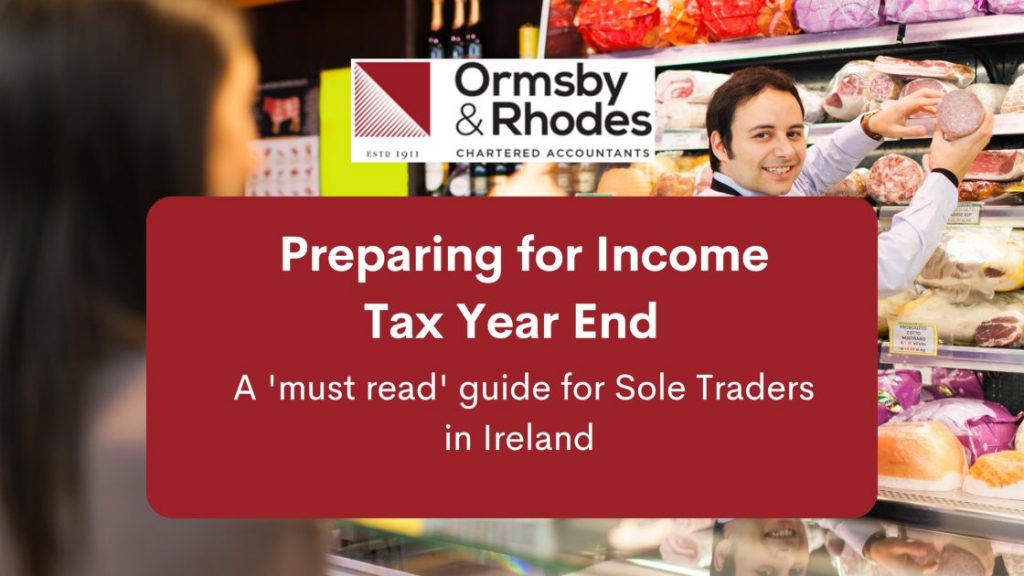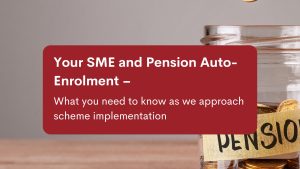A must read from the seasoned Tax experts at Ormsby & Rhodes as we approach Income Tax year end
One of the most important tasks for Sole Traders in Ireland is preparing and filing your income tax returns. Navigating through the process might seem daunting, but with the right approach and expertise, it can be manageable and even beneficial for your business. Here’s a comprehensive guide to help you prepare for your income tax returns as a sole trader, along with a breakdown of allowable expenses you can submit.
Review financial records:
Go back over your financial records for the year, verifying income and expenses and checking invoices and receipts, both business and personal. This will not only help you accurately report your income but also enable you to claim applicable tax deductions and credits. Consider leveraging a cloud-based system aimed at Sole Traders and SME’s, if not doing so already, that will enable you to produce reports for your Tax advisor and easily identify outstanding invoices.
Understand Your Tax Obligations:
Sole Traders in Ireland are subject to various tax obligations, including but not limited to Income Tax, Pay-Related Social Insurance (PRSI), and Universal Social Charge (USC). Understanding these tax liabilities is vital to plan your finances effectively. Experts, such as our Taxation team at Ormsby & Rhodes, can assist you in navigating your obligations.
Register for Self-Assessment
Remember, if you are new to being self-employed, you must register for self-assessment. This involves obtaining a Personal Public Service (PPS) number and registering for the Revenue Online Service (ROS). Self-assessment allows you to report your income and calculate your tax accurately.
Be aware of key dates
The Pay and File deadline for 2022 Income Tax Return (Form 11) is Wednesday 15th November 2023, however preparations should start as soon as possible.
Know your allowable expenses, for example:
Office Expenses: Rent, utilities, and office supplies.
Business Travel Costs: Fuel, public transportation, and accommodation for business-related trips. Note: this does not include travel to and from home to office.
Marketing and Advertising: Costs related to promoting your business.
Professional Fees: Fees paid to professionals like accountants or consultants.
Insurance: Business insurance premiums.
Equipment and Tools: The cost of purchasing or repairing equipment essential for your business.
Training and Development: Costs for courses or training relevant to your business.
Bank Charges: Fees associated with business bank accounts.
Motor Expenses: If you use your personal vehicle for business purposes.
Business subscriptions and Memberships: Cost of professional memberships, trade publications, and subscriptions relevant to their business.
Phone and Internet: Business-related mobile phone costs, and home WiFi services are allowable.
Home Office Expenses: If a Sole Trader operates a home office for business purposes, they may claim a portion of certain household expenses, such as utility bills.
Pension contributions: Contributions made to an approved pension scheme may be eligible for tax relief, subject to certain limits.
Health Expenses: Include personal medical expenses from throughout the year.
It’s important to note that the above expenses must be genuinely incurred for business purposes (with the exception of your personal medical receipts) and supported by receipts and invoices. Additionally, some expenses may be subject to specific restrictions or limitations, so seeking professional advice from the taxation experts at Ormsby & Rhodes is recommended to ensure compliance with the tax regulations and maximise allowable deductions.
At Ormsby & Rhodes we are here to support you in making the most of your Sole Trader tax return and keeping your business on the path to success.
Connect with our team at info@ormsby-rhodes.ie





